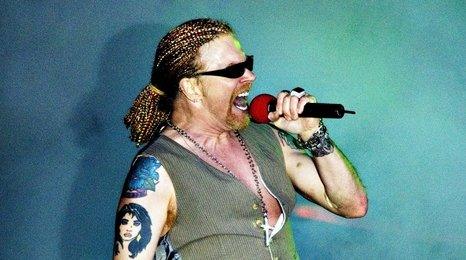Row over proposal to cap price of resold gig tickets
- Published
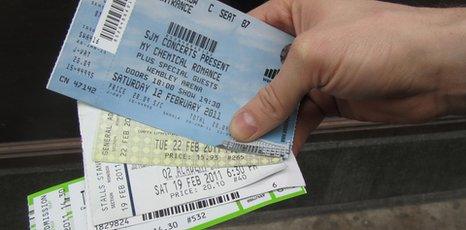
Some promoters and ticket resale companies disagree over online profits
Live music promoters and ticket resale companies are arguing over how much profit can be made when gig tickets are resold.
Tickets for Reading and Leeds festival went on sale last night and are already available on the web.
The argument is over a politician's proposal for a 10% profit limit - due to be discussed in parliament in May.
Festival boss Melvin Benn called the idea "fantastic" but online agent Seatwave branded it "rubbish".
The UK's ticket resale market, where fans can sell unwanted tickets to concerts, comedy and some sporting events, is currently unregulated.
'Illegal websites'
But Labour MP Sharon Hodgson is proposing that anyone reselling tickets can only make a 10% profit on the original price they paid.
For example, a Reading and Leeds ticket bought for £192.50 could only be resold for £211.75.
"I've been asking for it [a cap] for many years," said Melvin Benn, managing director of Festival Republic.
"It's the sort of bill that's been operational in New York State and Australia. It works. We've seen that it works.
"People will still try to set up illegal websites but what it would do is give the public an absolute knowledge that if they're trying to sell at more than that percentage, it's almost certainly dodgy and illegal."
'Black market'
The 170,000 tickets for Reading and Leeds are now on sale.
The festival is officially partnered with Viagogo, which claims to ensure the safe purchase of tickets for sold out events.
The Association of Independent Festivals (AIF), which represents UK events like Creamfields and Bestival, has also come out in support of the cap.
Ben Turner, vice-chair of AIF said: "Whilst we don't think these measures will provide a complete solution, the energy and efforts behind the push to make this happen should be supported and applauded."
But Seatwave's Joe Cohen criticised the bill - he said it would create a black market for ticket resales and would mean companies like his left the UK.
"When you put this idea into practice is where it falls down and turns into rubbish. There's no place on the planet where a cap works."
Get Me In, which is part of Ticketmaster, also criticised the proposal.
"Any attempts to regulate the market would reduce protection, transparency and choice for consumers," a spokesman said.
Face value
Artists have also been having their say.
Adele, whose 21 is the biggest selling album of the year so far, said she was in favour of the resale cap.
"I don't think that many people are worth [the inflated prices]. I think it's just a bit of a rip-off," she said.
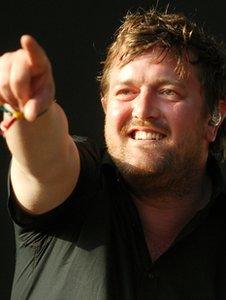
Elbow's Guy Garvey says fans should be able to make a profit on unwanted tickets
"I think there should be a complete cap."
US rockers My Chemical Romance, who headline this year's Reading and Leeds festivals in August, believe fans should respect each other and only sell a ticket at face value if they can't make it.
Lead singer Gerard Way said: "I feel like, if you can't go, charge what you paid for it. Because that's really what it's worth even if it does sell out.
Bass guitarist Mikey Way agreed: "There's nothing worse than getting gouged by a scalper [tout]. I remember being younger and paying ridiculous prices."
But not all artists think it's wrong for fans to make a profit by selling on tickets for gigs.
"If you've had the foresight to buy a ticket and then unfortunately can't go I think a mark-up of 50% is tolerable," said Elbow's Guy Garvey.
"Anything more than that is excessive," he added.
- Published30 August 2010
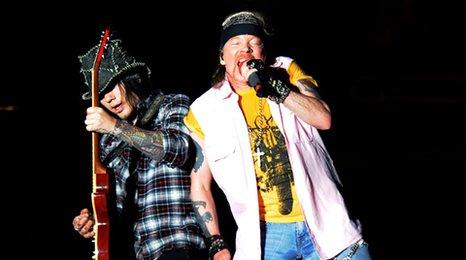
- Published28 August 2010
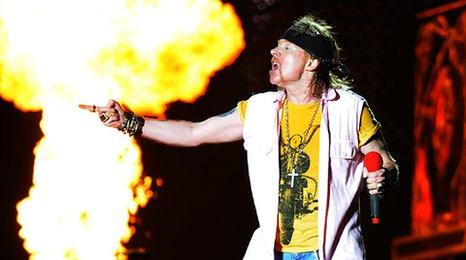
- Published28 August 2010

- Published27 August 2010
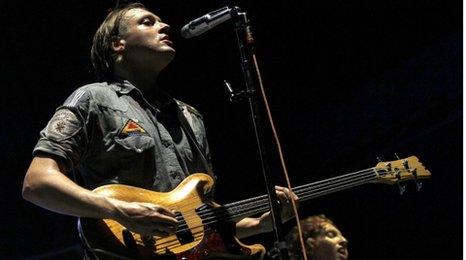
- Published27 August 2010

- Published24 August 2010
